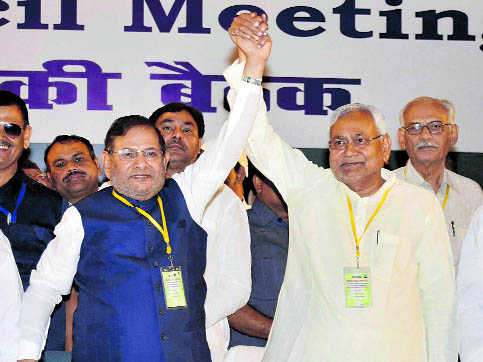
The rallying point for a “Sangh-mukt” Bharat? Bihar Chief Minister and newly elected JD(U) president Nitish Kumar being greeted by senior party leader Sharad Yadav at the party''s National Council meeting in Patna. PTI
KV Prasad
For the past few weeks, reports stating that a new political alignment is on the horizon have started appearing. The grand plan is to marshal secular forces and prepare a political formation that is ready for a showdown with the Bharatiya Janata Party in the 2019 General Election. Unlike the Left-driven chimera called the Third Front, the chief architect drawing the contours of a new plan is Bihar Chief Minister Nitish Kumar.
Even before his election as the chief of the Janata Dal (United), political strategists associated with the party began working behind the scenes to build a coalition of parties, preferably with a socialist leaning, that could collectively rally against a formidable BJP.
Aiming to test the waters, the plan envisages that such a formation should be in place by the time elections to the UP Assembly are held early next year. UP is considered to be a bell-weather state and holds a special place in Indian politics. For decades, the state held pride of place in national politics and till Indira Gandhi, it could boast of having provided a Prime Minister.
The nearly four-decade uninterrupted run was halted first by Morarji Desai and then by a succession of Prime Ministers — from PV Narasimha Rao onwards, till Narendra Modi restored the hallowed status.
The pathway being built by the JD (U) visualises roping in the Rashtriya Lok Dal of Ajit Singh, the party that continues to claim wide influence in western Uttar Pradesh. Incremental steps would have to be taken to subsume his outfit with the JD (U), which in the run-up to the 2019 Lok Sabha elections seeks to ramp up its pan-India presence. Having successfully stopped the BJP juggernaut under Narendra Modi and Amit Shah in the Bihar Assembly, Nitish Kumar is gradually moulding himself to be in the position of a formidable challenger to Prime Minister Modi three years down the line.
The prime argument advanced in support of this formulation is this is the only way forward by uniting against the BJP and the “divisive ideology” of the Sangh (RSS), the ideological arm of the BJP and its affiliates. It appears to be an extension of the formula that clicked in the Bihar Assembly polls.
Political antagonism between Prime Minister Modi and Chief Minister Nitish Kumar is not a state secret and the latter has never lost any opportunity to distance himself from Narendra Modi. The Bihar Chief Minister’s recent appeal that all non-BJP parties should join hands to make the country “Sangh mukt” (read free from the influence of the Rashtriya Swayamsevak Sangh) to save democracy is to build a counter political narrative to the Modi-slogan of “Congress-mukt Bharat”.
Nitish Kumar's comments stand in agreement with his pragmatic approach in Bihar, where he put aside the decades-old bitter rivalry with Lalu Prasad and the Rashtriya Janata Dal to reap an electoral harvest. While it is an easy precedent to cite, it is a difficult one to replicate at least within the estranged Janata parivar in general and the RLD and the Samajwadi Party in particular. Over the past three decades, vaulting ambitions of leaders within the Janata parivar resulted in the party witnessing a series of splits. Interestingly, the party founded by former Prime Minister Vishwanath Pratap Singh in the late 1980s does not exist in letter.
Once asked to comment on the fractious nature of Janata politics, VP Singh said wryly: “Dekhiye kitni urja hai (See the energy present)” that the party continues to split, survive and multiply. It reminds one of what another socialist veteran Ramakrishna Hegde had once said: any political leader who is angry forms a political party.
A couple of seasons ago, the estranged Janata parivar made a splash by announcing the merger with the Samajwadi Party and the Janata Dal (Secular) of HD Deve Gowda coming into the fold.
The declaration was greeted as a grand effort of the socialists to come under one banner yet it ended much before the agreement could be operationalised, what with Mulayam Singh Yadav having one of his many famous second thoughts.
The SP and the RLD leaders have a history of being difficult and are known as ones to change course mid-way. In 2002, the SP leader was the first to walk out of a “Peoples'Front,” formed with Harkishen Singh Surjeet taking the initiative. The ostensible reason was disagreement with the Front partners, the Left and Janata Dal (Secular) over backing APJ Abdul Kalam as the presidential candidate.
Similarly, Ajit Singh and the RLD shared power with both the Congress and the BJP and now have a dalliance with the JD (U). The RLD faced a political rout in the Lok Sabha elections in western UP, considered its pocket borough, and is now working to claw back.
The astute politician in Nitish Kumar is aware of the pitfalls and troubles peppered on the path he has embarked upon. The party is working on a plan to make it a major campaign point, aware that it can find traction with the women voters, who constitute half of the population and drive home an advantage. Prohibition and electoral politics is certainly a heady brew. While issues can and will be worked upon, eventually Kumar will need to have the Indian National Congress and its leadership, especially Rahul Gandhi, firmly behind him to emerge as a principal challenger to Prime Minister Modi and the BJP. Maybe he should seek counsel from CPI (M) General Secretary Sitaram Yechury, who quietly struck an unthinkable deal with Rahul Gandhi ahead of the elections in West Bengal.



























